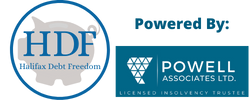Debt Relief Nova Scotia: Your Options Explained

Are you considering debt relief in Nova Scotia? If yes, then you’re not alone. With a national debt of over $691 billion, it’s no longer a secret that Canadians are wallowing in debt. According to a survey carried out at the beginning of the year, one in every five respondents revealed they would have no option but to liquidate their assets to pay off or reduce their debt before the year ends. As if not bad enough, another survey conducted by IPSOS reported that nearly half of the Canadian population is $200 away from insolvency.
The report goes on to add that while a majority of those hovering close to bankruptcy are women, the whole Canadian population, in general, is drowning in debts! So if you’ve been in this predicament and looking for a solution, take comfort in knowing you’re not alone. Also, you’re in good company as we’re about to outline your debt relief options.
Debt can be a symptom of any number of problems and life circumstances. However, it is important to understand that YOU ARE NOT YOUR DEBT.
At Halifax Debt Freedom, we'd love to discuss how we can help you become debt free.
Reasons behind the Rising Levels of Consumer Debts
Canada is a nation famed for its moderation, but the rising levels of consumer debt are a cause for alarm. If you like many others are wondering why there’s unending debt in the country, here are some key reasons:
Low Interest
While there are many reasons behind the increasing levels of consumer debts, low interest has been termed the key culprit. After the 2008s global financial recession, Canada, like most countries across the world, lowered its interest rates. This, in turn, gave Canadian citizens a false sense of security, encouraging them to borrow excessively. Since then, consumer debt has been growing at a slow yet gradual pace and is now a cause for concern.
Canadian Economy
Besides low-interest rates, our country’s economy has also been blamed for the increasing debts. In the real estate sector, for instance, non-uniform property pricing makes individuals in certain regions more vulnerable to debts than in others. In Vancouver, for instance, property prices are at their all-time high due to housing shortages and increasing mortgage rates. Contrast this to Nova Scotia where income levels have not risen significantly in recent years.
Signs You’re In Debt
No one wants to accept that they’re in debt. This means that even though wallowing in it, you may not realize it. But the sooner you do, the easier it’ll be to work your way out. That said, here are some signs you’re headed in towards financial trouble
- You’re always stressed or worried about money.
- You pick the bills you pay, and even when you do, you can only manage to pay off half.
- Majority of your income goes to debts
- You’ve maxed out all your credit cards.
- You’ve started using up your savings
What are other options when considering Debtor Assistance?
Whatever the reason behind your constant debt might be, it’s possible to be debt-free. Here are some solutions you could try
Consumer Proposal & Bankruptcy
Consumer proposals and Bankruptcy is one of the most effective debt forgiveness options among Canadians. A consumer proposal is a debt help program that is a legally binding settlement available under the Bankruptcy and Insolvency Act. This proposal is between you and your creditors, and depending on the terms, it gives you up to five years to repay a portion of your debts. Depending on your specific circumstances this could also help with Nova Scotia student loans which are harder to obtain debt relief on.
Once this period is over and the amount is fully paid, your debt is legally discharged. Consumer proposals can be structured in a variety of ways and take into account several factors. These include but are not limited to your income, household size, circumstances of your debt, the creditors that you owe money to, and how much you can afford to pay.
A bankruptcy is the most sever relief program that exists and is based upon your income and assets.
Debt Consolidation
In debt consolidation, the debtor takes one new loan and uses it to pay off other smaller loans. This then leaves them with one loan, which makes the repayment process less hectic. It also makes it more affordable as debt consolidation loans usually have lower interest rates, and payments are spread over a more extended period. If you find this option suitable, you can consolidate using
- A bank, credit union or finance company loan
- Home equity or refinance mortgage
- Line of credit or overdraft
- Credit cards
Debt Settlement
In a debt settlement, the debtor, or a firm representing the debtor, negotiates with the creditor directly. The two parties create an informal agreement in which the debtor agrees to pay a portion of the debt. Even though this option enables you to pay back a lesser amount, the sum of money required is often due in a single lump sum. This can be cost-prohibitive for many people but for those that can do this, it is a great debt forgiveness option.
Debt Management Programs
Besides debt settlement, consolidation, or consumer proposal, you can also opt for debt management programs. Also known as credit counselling, debt management programs do not in any way help you reduce or cancel your debt. They involve working with a non-profit credit counsellor who summarizes all your debts, prepares a repayment plan, and then presents it to your creditors. Unfortunately, this can be one of the most expensive options available in Canada. Not only do you pay back your debt in full, but credit counselling companies often charge a fee for this service which generally ranges from 5-15% of the overall debt load.
Now that you know your options, how do you choose the right one? The best option depends on several factors which include
- The extent of the debt.
- The type of debt, for instance, credit card, mortgage, or student loan.
- Your credit score history, for example, have you ever defaulted before or are you behind on any of your utility bills?
- Your disposable income
Debt Relief for a Nova Scotia Student Loan
Nova Scotia Student Loan & Federal Student Loan debt are one of the toughest types of accounts to obtain debt relief on. As a Nova Scotia student you do have options.
National Student Loans Service Centre – Repayment & Student Assistance Programs
Your first option is to contact the National Student Loans Service Centre which can outline the various student assistance programs that are available for both Nova Scotia student loan as well as Canada student loan. The page that discusses your monthly payment options is here.
Repayment Assistance Plan
The most popular amount all student assistance programs, the Repayment Assistance Plan (RAP) is a program that, based on your income & financial situation, will reduce or completely eliminate the payments you are creditors to pay to your student debt creditors. It is offered by the Government of Canada. This form of student assistance is the first stop we recommend consumers make.
Bankruptcy or Consumer Proposal
Both a bankruptcy and a consumer proposal can help with Nova Scotia student loan debt. While both are untraditional assistance programs, in the context of student loan debt relief, they are highly effective.
Not only can these help with credit card, and other unsecured debts, they can help with both provincial and Canada Student loan debt.
You are required to have been out of school for a minimum of 7 years before these can provide any type of principle reduction relief. If you have been in school within 7 years then each program will simply eliminate any monthly payment that you are required to make. Interest does continue to accumulate but for most, the reduction in payments allows an individual to get ahead.
Final Thoughts
Financial difficulties are inevitable. Even the wealthiest individuals face them too. The only difference is that each person’s problems are unique. So don’t weigh yourself down when in debt. Also take comfort in the fact that a majority of Canadians, as noted earlier, are in the same boat as you. All the above options are suitable for debt relief, but each one comes with its pros and cons.
Therefore, we always recommend you seek expert advice and the assistance of a professional that has your interests top of mind when trying to understand which debt relief option is most suitable for your situation.
This article was written by David Moffatt, a Debt Relief Expert. He has helped assist in creating plans that have helped save Nova Scotia residents over $30 million dollars of consumer and tax debt since 2015. We believe that no consumer should have to struggle with the stress of overwhelming debt. Our debt restructuring strategies can help you cut your debt by up to 80%.
If you are struggling with debt please reach out. It hurts to continue to suffer financially. Halifax Debt Freedom services Halifax, Dartmouth, Bedford, Sackville the entirety of HRM, and all of Nova Scotia.
Comments are closed.


2 Comments
These assistance programs were of no use to me as they did not resolve any of the conflicts that I had with my lender. I had to contact a broker to help me resolve all the issues.
Hi Morgan,
Thanks for your comment! It is extremely rare that some sort of debt restructuring doesn’t work. However, when people have a lot of equity in their home a mortgage broker is generally a good option.